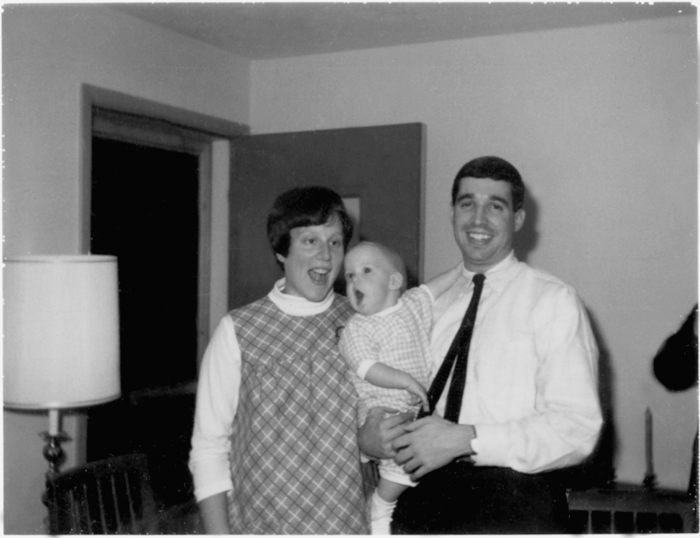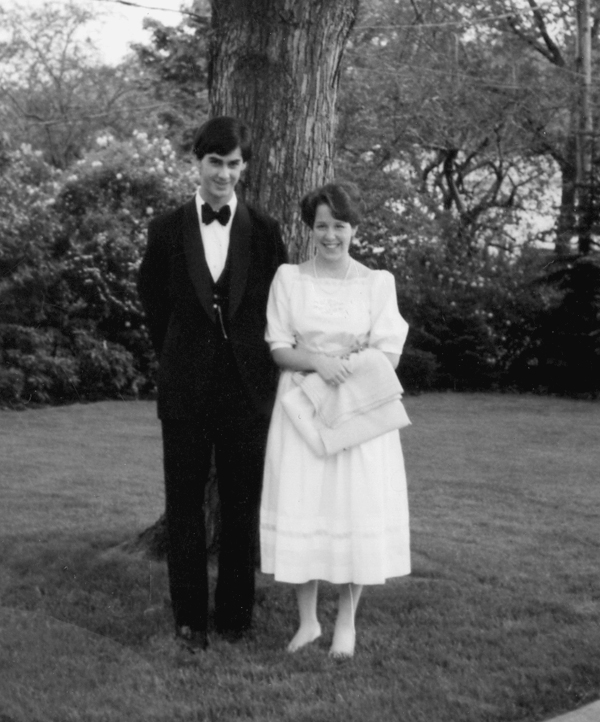Then Comes Marriage (40 page)
Read Then Comes Marriage Online
Authors: Roberta Kaplan

As I sat there listening to the arguments of John Bursch, the former solicitor general of Michigan, I remember thinking that if these were the only arguments our adversaries were still willing to advance in court, then there was little chance that we were going to lose. Bursch, for example, asserted assuredly to the justices that the “view on the other side here is that marriage is all about love and commitment. And as a society, we can agree that that's important, but the State doesn't have any interest in that.” As I often find myself saying to my son, “Wait a minute.” The government doesn't have any interest in the love and commitment of married couples? Not only was that news to me and almost everyone else in the courtroom, but it was inconsistent with the lived experiences of most Americans.
Whatever lingering doubts I had that we might lose were dispelled after the following exchange between Bursch and Justice Kennedy:
BURSCH
:
And what they are asking you to do is to take an institution, which was never intended to be dignitary bestowing, and make it dignitary bestowing . . .
JUSTICE KENNEDY
: [J]ust in fairness to you, I don't understand this not dignity bestowing. I thought that was the whole purpose of marriage. It bestows dignity on both man and woman in a traditional marriage.
BURSCH
: It's supposed toâ
JUSTICE KENNEDY
: It's dignity bestowing, and these parties say they want to have thatâthat same ennoblement.
BURSCH
: Sure.
JUSTICE KENNEDY
: Or am I missing your point?
BURSCH
: I think you're missing my point. If we go back to that world where marriage doesn't exist and the State is trying to figure out how do we link together these kids with their biological moms and dads when possible, theâglue are benefits and burdens, but not necessarily dignity. You know, dignity may have grown up around marriage as a cultural thing, but the State has no interest in bestowing or taking away dignity from anyone, and certainly it's not the State's intent to take dignity away from same-sex couples orâor from anyone based on their sexual orientation.
JUSTICE KENNEDY
: Well, I think many States would be surprised, with reference to traditional marriages, they are not enhancing the dignity of both the parties.
But perhaps the most dramatic and critical moment at the oral arguments that day turned out not to be what any of the justices or lawyers had to say. Approximately thirty minutes into the arguments, a man in the back of the galley started screaming violently that all “gays” were going to hell. While his words don't show up in the official transcript, the heckler, who was soon removed from the courtroom and arrested, kept shouting, “If you support gay marriage, you will burn in hell” and “Homosexuality is an abomination,” as he was being dragged out of the building. Even though the courthouse was full of federal marshals that day, the experience was frightening. On the other hand, it's hard to imagine a more powerful demonstration of the kind of irrational hatred and prejudice against a minority group that in the past has caused our nation's highest court to step in to enforce the mandates of our Constitution.
After the argument ended, the waiting game began again. Although not as torturous for me as it was in 2013, it wasn't exactly relaxing, either. However, when on June 22 the Supreme Court added June 26 as a new date for the Court to release decisions for the term, I knew that we had won. There was no way that the Supreme Court was going to issue a decision harmful to the rights of gay people on June 26âthe anniversary of both the
Lawrence
and the
Windsor
decisions. So when the decision came out on June 26, as I sat in San Francisco, away on business, on a conference call with Edie, Rachel, and the rest of the Paul, Weiss team, I felt an almost indescribable sense of exhilaration, one that only became stronger when I read Justice Kennedy's opinion itself.
To the extent that there had been any remaining uncertainty as to whether the
Windsor
decision had stood for the equal dignity of gay people,
Obergefell
made that point explicitly. In words bound to be read by officiants at weddings for many years to come, Justice Kennedy wrote:
No union is more profound than marriage, for it embodies the highest ideals of love, fidelity, devotion, sacrifice, and family. In forming a marital union, two people become something greater than they once were. As some of the petitioners in these cases demonstrate, marriage embodies a love that may endure even past death. It would misunderstand these men and women to say they disrespect the idea of marriage. Their plea is that they do respect it, respect it so deeply that they seek to find its fulfillment for themselves. Their hope is not to be condemned to live in loneliness, excluded from one of civilization's oldest institutions. They ask for equal dignity in the eyes of the law. The Constitution grants them that right. . . .
It is so ordered.
This was itâall that we had ever hoped and worked for. Immediately, gay and lesbian couples began marrying throughout the country. Even in Mississippi, after some initial hemming and hawing by Governor Phil Bryant, the Fifth Circuit ruled as follows on July 1, 2015: “
Obergefell
. . . is the law of the land and consequently, the law of this circuit and should not be taken lightly by actors within the jurisdiction of this court.” Our Mississippi clients Andrea Sanders and Becky Bickett were finally married in their hometown of Pass Christian on July 5, 2015, with their twin sons there as witnesses. Rather than try to describe their feelings for them, here are Andrea's own words: “OK. For those of you who have been wondering when it is happening . . . we are getting married this Sunday. After 11 years, it is finally happening!” Since we couldn't be there in person, and to reciprocate for all the great Southern food we had shared together, we sent them a gift basket of food from Zabar's on the Upper West Side.
THERE WERE MANY
times during the summer after
Windsor
was decided when I felt like the guy in the Chagall painting, floating high above the world in a state of exultation. Rabbi Heschel has referred to this as a “sense of the ineffable.” But we obviously can't live every day in the clouds. While we all have to return to the ground, I still experience those Chagall moments at times. That certainly happened on June 26, 2015, when the Supreme Court handed down its decision in
Obergefell
v.
Hodges
. I also experience that feeling whenever I encounter something that is completely ordinary today that would have been completely extraordinary only a couple of years ago. Perhaps the best example of this is when our then-seven-year-old son Jacob asked us, after we had watched the movie
My Fair Lady
, whether it was an old-fashioned movie since it was made “before men could marry men.”
In the end, “it's all about Edie” is really only another way of saying that it's all about dignity. While cases, precedents, and constitutional doctrine matter, so do the lives of the people targeted by discriminatory laws. I had to recognize my own dignity as a lesbian before I could be truly effective as an advocate. Those brave queens at Stonewall had to fight back in 1969 so that they would no longer be subject to arrest simply for being gay. Evan Wolfson, while still a student at Harvard Law School, had to have the vision to write a paper in 1983 entitled “Samesex Marriage and Morality: The Human Rights Vision of the Constitution.” Mary Bonauto had to bring those first cases in Vermont and Massachusetts when many thought she was being reckless, crazy, or both. Edie Windsor had to stand up and sue the United States of America to honor her marriage to Thea Spyer. Jim Obergefell in Ohio and Carla Webb and Joce Pritchett in Mississippi had to go to court to have their marriages legally acknowledged. Countless other gay men and lesbians had to step forward and demand that their dignity be recognized by their families, neighbors, colleagues, and finally their own government. And, together, we changed the world.

Here I am “talking” with my parents on my first birthday in 1967, just a few months after Edie and Thea became engaged.

Aaron Belkin and me at our high school prom in Cleveland in 1987.

Sitting at Chief Judge Kaye's desk (which previously belonged to Judge Benjamin Cardozo) during my clerkship.

Rachel Lavine and Emily Giske marching for the Gay & Lesbian Independent Democrats at New York's Gay Pride Parade in 1995. New York Assemblymember Deborah Glick and LGBT activist Tom Schuler are with them.

Edie and Thea in August 1969, two years into their forty-year engagement.
Courtesy of Edie Windsor

Edie at her job writing software for IBM.
Courtesy of Edie Windsor